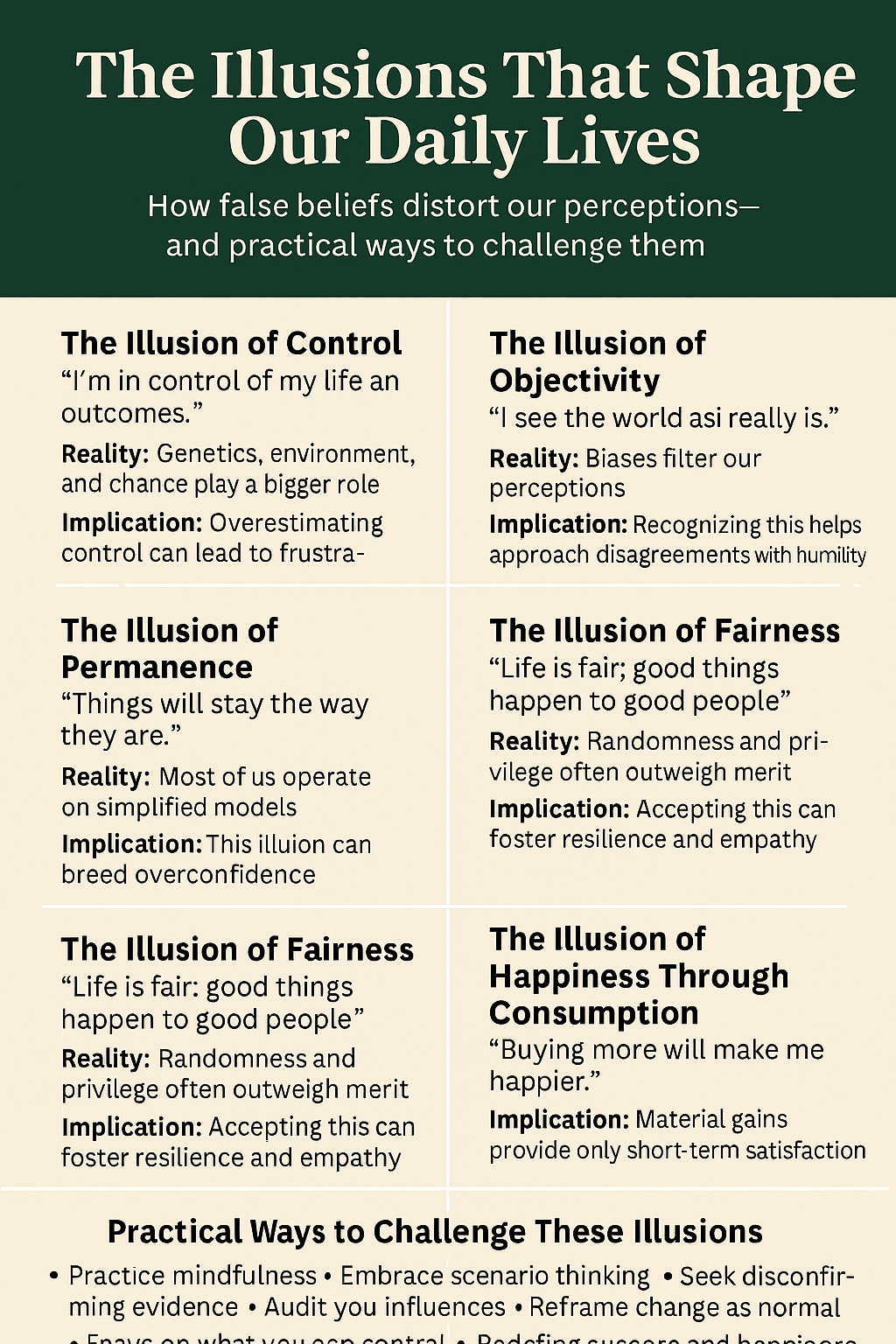Summary
These illusions aren’t inherently evil; they provide stability and meaning. But when left unexamined, they can distort our decisions and expectations.
Here are some of the most powerful illusions shaping our daily lives.
1. The Illusion of Control
Belief: “I’m in control of my life and outcomes.”
For instance, while we may believe that our career success is solely a result of our hard work and talent, the reality is that factors like economic conditions, company policies, and even luck play significant roles.
Implication: Overestimating control can lead to frustration when life doesn’t follow our script.
2. The Illusion of Permanence
Belief: “Things will stay the way they are.”
Reality: Everything changes—relationships, jobs, health, markets—yet we plan as if stability is guaranteed.
Implication: Clinging to permanence makes change feel like failure instead of a natural process.
3. The Illusion of Knowledge
Belief: “I understand how things work.”
Reality: Most of us operate on simplified mental models and incomplete information.
Implication: This illusion can breed overconfidence and poor decision-making.
4. The Illusion of Objectivity
Belief: “I see the world as it really is.”
Reality: Our perceptions are shaped by biases, culture, and personal experiences.
Implication: Recognizing this helps us approach disagreements with humility.
5. The Illusion of Free Will
Belief: “I make rational, independent choices.”
Reality: Decisions are heavily influenced by subconscious processes, social pressure, and marketing.
Implication: Awareness can help us pause before reacting impulsively.
6 The Illusion of Fairness
Belief: “Life is fair; good things happen to good people.”
Reality: Randomness, privilege, and systemic factors often outweigh merit.
Implication: Accepting this can foster resilience and empathy.
7. The Illusion of Progress
Belief: “Technology and society are always improving life.”
Reality: Progress often brings trade-offs—new problems replace old ones.
Implication: Blind optimism can prevent us from addressing unintended consequences.
8. The Illusion of Happiness Through Consumption
Belief: “Buying more will make me happier.”
Reality: Material gains provide only short-term satisfaction; happiness is more tied to relationships and purpose.
Implication: Chasing possessions can leave us feeling emptier than before.
9. Practical Ways to Challenge These Illusions
- Practice Mindfulness
- Pause before reacting. Notice when you feel certain and ask, “What assumptions am I making?”
- Embrace Scenario Thinking
- Instead of planning for one future, consider multiple possibilities. This reduces the shock of change.
- Seek Disconfirming Evidence
- Actively seek information that challenges your beliefs.. It’s uncomfortable, but it’s powerful.
- Audit Your Influences
- Notice how marketing, social media, and peer pressure influence your choices.. Limit your exposure when needed.
- Reframe Change as Normal
- Expect impermanence. Build flexibility into your plans and mindset.
- Focus on What You Can Control
- Differentiate between influence and cocoon. Invest energy where it matters most.
- Redefine Success and Happiness
- Shift from material accumulation to purpose, relationships, and experiences.
Conclusion: Living Beyond Illusion
We can’t eliminate illusions, nor should we try. They serve a purpose. But by questioning them, we gain clarity and resilience. The next time you feel sure about how the world works, pause and ask: What if this is just an illusion I’ve accepted as fact?
